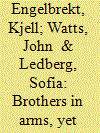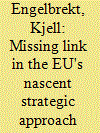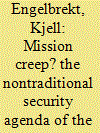|
|
|
Sort Order |
|
|
|
Items / Page
|
|
|
|
|
|
|
| Srl | Item |
| 1 |
ID:
148055


|
|
|
|
|
| Summary/Abstract |
2014–2015 were years of turmoil for strategic relations, with Sino-Russian relations emerging as a particularly interesting set of ties to observe. This article asks whether recurrent Sino-Russian exhortations of friendship are mirrored by their strategic alignment in the defence and security realm, half a century after the end of the Sino-Soviet pact during the communist era. We examine the arms trade between the two countries and with regional partners, but also the recent pattern of bilateral and multilateral military exercises, as a combined test of the security and defence relationship. We are able to show that the image of friendship that both Moscow and Beijing like to promote, while apparent at the UN Security Council and within the BRICS group, remains constrained by rivalry in high-tech segments of the arms industry and by lingering concerns about the prospects of peer interference in their shared regional vicinity.
|
|
|
|
|
|
|
|
|
|
|
|
|
|
|
|
| 2 |
ID:
116291


|
|
|
|
|
| Publication |
2012.
|
| Summary/Abstract |
The Lisbon Treaty enacted in 2009 allows the European Union (EU) to adopt a foreign, security, and defense policy with a higher profile. In particular, the High Representative and the European External Action Service are now in a position to conduct a continuous conversation with China, India, Japan, and ASEAN beyond trade-oriented dialogues. But a genuine strategic approach toward Asia requires military expertise so as to adequately assess how to best contribute to stability in this part of the world. Military diplomacy involving individual member states already takes place, yet virtually no information is shared at the EU level. The adoption of a full-fledged strategic approach toward Asia would not only be politically astute and make excellent economic sense; it can also consolidate EU institutions in the realm of foreign, security and defense policy.
|
|
|
|
|
|
|
|
|
|
|
|
|
|
|
|
| 3 |
ID:
142207


|
|
|
|
|
| Summary/Abstract |
In 2008–2011, the Group of 20 swiftly eclipsed the Group of 7, created in the mid-1970s as an informal mechanism for stabilizing markets and facilitating transnational currency exchange and investment. Several observers have expressed the view that the former, broader group is also destined to appropriate the role of the Group of 8, the G7's pioneering successor in the realm of nontraditional security. This article examines the G7/8 legacy of forging quasi-permanent institutional arrangements and frameworks in this policy area and goes on to gauge nontraditional security initiatives subsequently launched by the G-20. Having juxtaposed the past record of these bodies and analyzed the interests and power dynamics that influence member state action in the short and long term, the article outlines three basic options for how the relationship between the G-20 and the G7/8 may evolve.
|
|
|
|
|
|
|
|
|
|
|
|
|
|
|
|
| 4 |
ID:
098826


|
|
|
|
|
| Publication |
London, Routledge, 2010.
|
| Description |
xv, 288p.
|
| Series |
Routledge contemporary Russia and Eastern Europe series; 21
|
| Standard Number |
9780415561051, hbk
|
|
|
|
|
|
|
|
|
|
|
|
Copies: C:1/I:0,R:0,Q:0
Circulation
| Accession# | Call# | Current Location | Status | Policy | Location |
| 055216 | 327.4704/ENG 055216 | Main | On Shelf | General | |
|
|
|
|
| 5 |
ID:
192920


|
|
|
|
|
| Summary/Abstract |
This article examines Sweden’s successful 2016 bid to serve at the United Nations Security Council (UNSC) and shows that the subsequent 2017–18 tenure relied on a formula with three key elements. One was to mobilize the competitive advantages of its Ministry of Foreign Affairs (MFA), and a second to systematically highlight Africa-related priorities. A third element was to boost the standing of the E10 category of members in day-to-day diplomatic practice. After securing a plurality of votes in the General Assembly, Swedish diplomats went to work with a unique constellation of concurrently serving likeminded countries, generally receptive to Stockholm’s priorities. The formula appears to have contributed to a solid performance in 2017–2018. That said, the UNSC is not conducive to individual E10 members having a lasting impact on its institutional memory.
|
|
|
|
|
|
|
|
|
|
|
|
|
|
|
|
|
|
|
|
|